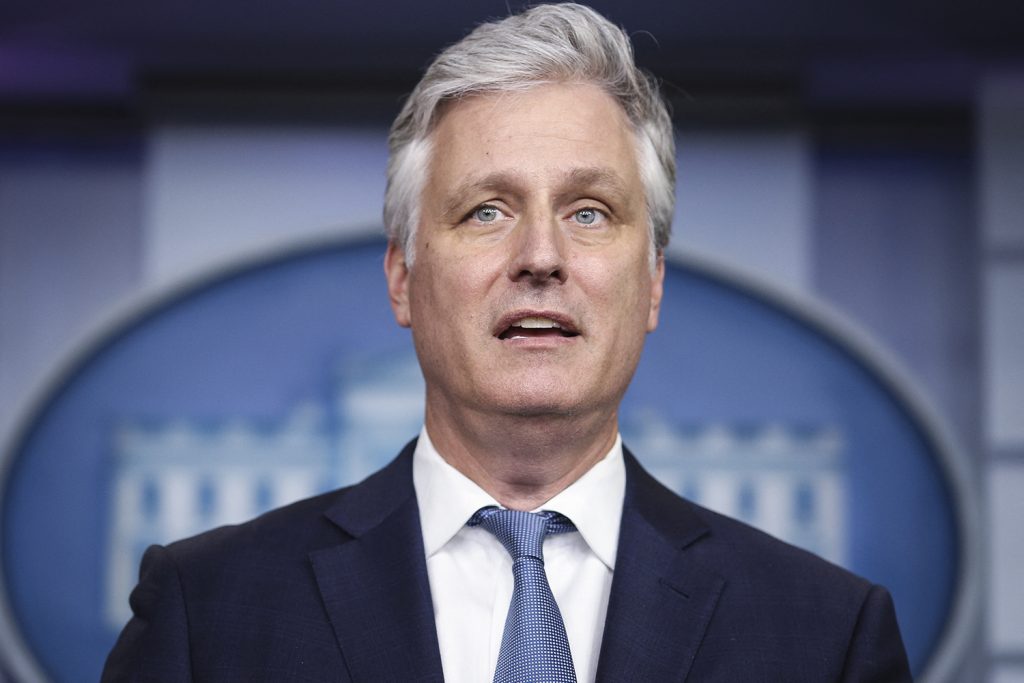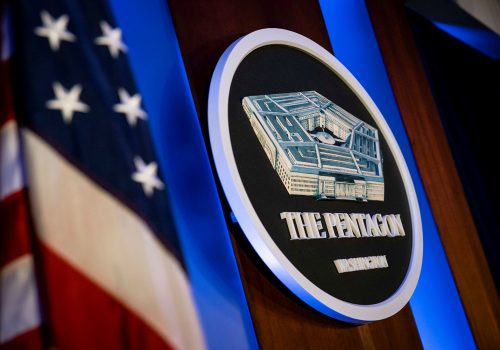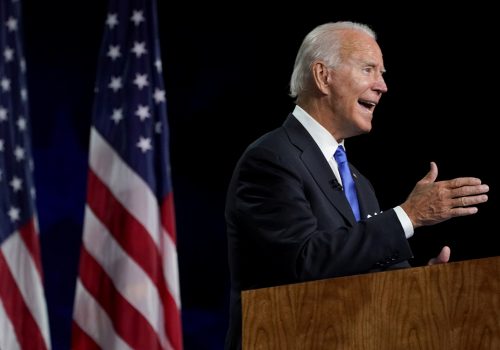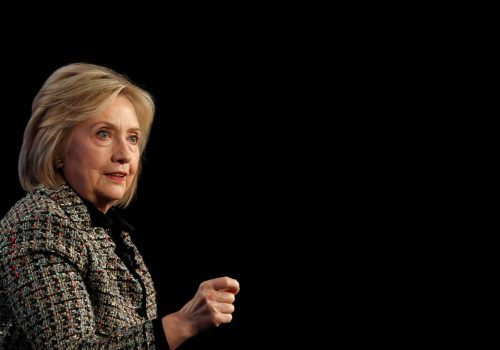Key takeaway: US National Security Advisor Robert C. O’Brien said the United States must be prepared to push back against Chinese aggression militarily, diplomatically, and economically, asserting that China continues to threaten its neighbors and attack US interests.
Speaking at an Atlantic Council Front Page event broadcast on August 28, O’Brien also dismissed accusations from Beijing that a US spy plane violated Chinese airspace on August 25. The national security advisor stated that he “certainly reject[s] any Chinese claims that flights over the South China Sea and their manufactured claims constitute some sort of breach of a norm or a rule.”
In his conversation with former US Undersecretary of State for Global Affairs Paula J. Dobriansky, who is also vice chair of the Atlantic Council’s Scowcroft Center for Strategy and Security and a senior fellow at Harvard’s Belfer Center, O’Brien defended the Trump administration’s strategy towards allies and highlighted what he saw as President Donald Trump’s main foreign-policy successes as his first term nears its end. Here’s a brief look at what O’Brien said:
The United States “is not going to back down” on China
- US acting properly in South China Sea: Chinese officials allege that an American U-2 spy plane flew into no-fly zone while Chinese forces were conducting military exercises on August 25 O’Brien denied that the United States did anything wrong, stating that “the United States always reserves its right to have freedom of navigation and freedom of aviation. In all cases we do it in a safe manner. We do it in a professional manner. Our soldiers, sailors, airmen, and marines always participate in their drills in a manner that ensures their safety and the safety of others.”
- Chinese maritime claims absurd: O’Brien criticized China’s attempts to “annex a vast swath of the Western Pacific Ocean and claim it as Chinese territorial waters,” saying that Beijing views international waters like “internal waterways,” and treats them “almost like it was talking about Lake Tahoe.” Despite China’s aggression and claims, O’Brien promised that “the United States is not going to back down from its long-held principles that the world’s oceanways and international waters should be free for navigation, and the same with space and with air rights in international airspace.”
- Concern over China’s regional actions: O’Brien warned that China is becoming more assertive in its region, looking to “export” its harsh form of domestic political control to Hong Kong through its new National Security Law, and “bullying” Taiwan and India militarily, as seen in the recent border clash between the Chinese and Indian armed forces.
- Competition across all spectrums: The national security advisor argued that the United States needs to focus on the full range of Chinese behavior, not just Beijing’s military aggression. “We have to stand up to China’s unfair trading practices” he said, adding Chinese influence in US capital markets and intellectual-property theft as additional concerns. “We have to confront the Chinese across all spectrums,” he argued. “They’re a very dedicated competitor or adversary. They work in every spectrum from diplomacy to the military to their economic efforts.”
United States is re-engaging in the Indo-Pacific
- US investment is robust in the Indo-Pacific: O’Brien downplayed concerns from regional actors that the United States is being out-invested in the Indo-Pacific region by China. He highlighted that the US private sector has invested more than $1 trillion “among our partners in the Indo-Pacific. It’s twice as much as China and Japan combined.”
- Optimism about the Quad: This private-sector engagement complements a growing diplomatic effort to coordinate with allies and partners against Chinese aggression, O’Brien argued. He described the “Quad”—a partnership forum between the United States, Japan, India, and Australia—as “one of the most exciting diplomatic initiatives and one of the areas most likely to succeed and pay huge dividends in the future.” Factoring in the security and defense deals and humanitarian efforts the United States has pursued in the region, O’Brien stated that the United States is “doing a lot in the Indo-Pacific” to counter the rising China challenge.
Alliances are important, but partners must “raise your game”
- Allies matter: While the Trump administration has faced criticism for straining relations with many of the United States’ top allies, O’Brien contended that President Trump “talks about America First, but he also makes it very clear…that doesn’t mean America alone.” O’Brien called the United States’ network of alliances “one of the great strategic advantages we have” especially compared with China and Russia, who “have very few true allies.” O’Brien acknowledged that “this doesn’t mean that everything’s perfect between [allies and the United States] all the time, but we’ve got great partners and that puts us in a very unique position to lead.”
- Buy-in from partners needed: But while allies provide the United States with an important advantage, these partners also need to do more to contribute to defense and stability, O’Brien argued: “We want to make sure that our allies bear the burden and pay their fair share when it comes to defending the global commons, when it comes to defending the alliance. It can’t just be the US anymore. We have to have a buy-in from our allies.”
- NATO has made progress: O’Brien also credited President Trump with pushing NATO allies to increase their defense-spending levels. Before the spending turnaround, O’Brien explained, the allies “had no readiness. They weren’t maintaining their platforms. They didn’t have enough troops. And the president said, ‘this just doesn’t work.’” By telling his partners to “raise your game,” the national security advisor said, Trump achieved important progress in helping share the defense burden in Europe.
Assessing Trump’s foreign-policy record
- Successes in the Middle East: When asked by Dobriansky about what he considers to be the primary foreign-policy successes of the Trump administration, O’Brien noted the US campaign against ISIS, which “destroyed the physical caliphate,” and “was able to bring justice to [leader] Bakr al-Baghdadi.” He also added the US withdrawal from the Iran nuclear deal, which he called the “worst diplomatic deal that the West had been engaged in…since 1938 in Munich,” and the successful negotiation of a peace deal between the United Arab Emirates and Israel, noting that next week he will be on the first direct flight between the two countries in history.
- Opportunity in Afghanistan: O’Brien also said he is optimistic that the Trump administration will fulfill its promise to wind down the US troop presence in Afghanistan. “We’ve got a pathway to get our troops home from Afghanistan and hopefully to have inter-Afghan peace,” he said. He cautioned, however, that “ultimately it’s up to the Afghan people to come together and come to an accord so that they can govern themselves.”
- Unheralded progress in space and Latin America: He also highlighted two areas of promise that have received little attention. He celebrated the emergence of the American private space sector, which has “really led the way in space” and achieved the successful delivery of American astronauts to the International Space Station in May on a US-made rocket for the first time since 2011. He also lauded “a tremendous renaissance going on in the Western Hemisphere,” where with the exception of Cuba, Nicaragua, and Venezuela, “we have a hemisphere of democracies committed to the rule of law.”
The Scowcroft model
- Remembering Brent Scowcroft: O’Brien reflected on the August 6 death of former US National Security advisors, General Brent Scowcroft, who was also chairman of the Atlantic Council and chairman of the Council’s International Advisory Board. “I think every national security advisor since General Scowcroft who’s taken this role has said, ‘I want to be like Brent Scowcroft,’” O’Brien said, adding that Scowcroft “brought a level of sophistication to his work as the national security advisor that’s been hard for any of us to live up to.”
- Embracing the Scowcroft model: O’Brien explained that many of his organizational changes to the National Security Council (NSC) were inspired by embracing “the Scowcroft model.” O’Brien said the NSC he inherited “had become bloated” and “unaccountable,” so he sought to cut the number of staffers and streamline processes. Above all, he focused on ensuring that the NSC gave “the best advice [and] the best options vetted and in front of the president.”
- Process over positions: He emphasized that “we try not to take a policy position as NSC staff or myself as national security advisor,” but rather focus on ensuring a process that incorporates all the information and opinions needed to bring to the president. By “running the full process,” he explained, the staff can help the president “find out where the pitfalls are, [where] the traps are in a potential policy or a reaction to some world event that takes place, [and] keep America safer.” General Scowcroft, O’Brien added, “understood that better than many national security advisors and many people in foreign policy.”
David A. Wemer is associate director, editorial at the Atlantic Council. Follow him on Twitter @DavidAWemer.
Further reading:
Image: Robert O'Brien, national security adviser, speaks during a news conference in the James S. Brady Press Briefing Room at the White House in Washington, D.C., U.S., on Thursday, Aug. 13, 2020. Israel and the United Arab Emirates reached an agreement to fully normalize relations, a potentially historic breakthrough that U.S. President Donald Trump said will facilitate peace in the Mideast. Photo by Oliver Contreras/Pool/ABACAPRESS.COM



